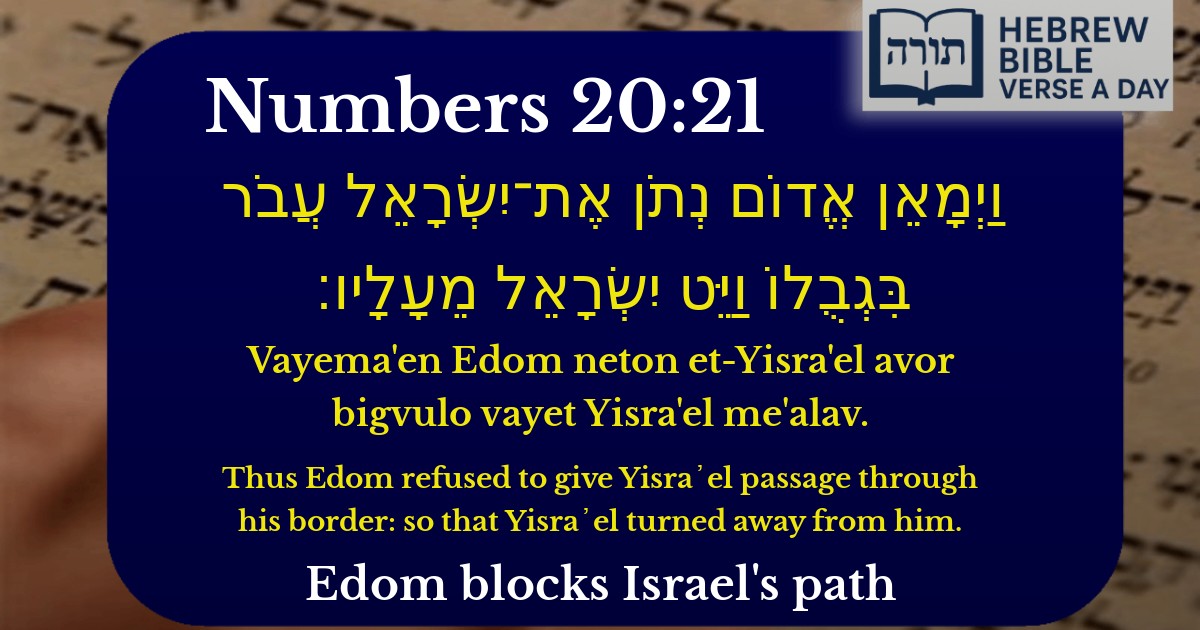Join Our Newsletter To Be Informed When New Videos Are Posted
Join the thousands of fellow Studends who rely on our videos to learn how to read the bible in Hebrew for free!
Hebrew Text
וַיְמָאֵן אֱדוֹם נְתֹן אֶת־יִשְׂרָאֵל עֲבֹר בִּגְבֻלוֹ וַיֵּט יִשְׂרָאֵל מֵעָלָיו׃
English Translation
Thus Edom refused to give Yisra᾽el passage through his border: so that Yisra᾽el turned away from him.
Transliteration
Vayema'en Edom neton et-Yisra'el avor bigvulo vayet Yisra'el me'alav.
Hebrew Leining Text
וַיְמָאֵ֣ן <b>׀</b> אֱד֗וֹם נְתֹן֙ אֶת־יִשְׂרָאֵ֔ל עֲבֹ֖ר בִּגְבֻל֑וֹ וַיֵּ֥ט יִשְׂרָאֵ֖ל מֵעָלָֽיו׃ <span class="mam-spi-pe">{פ}</span><br>
וַיְמָאֵ֣ן ׀ אֱד֗וֹם נְתֹן֙ אֶת־יִשְׂרָאֵ֔ל עֲבֹ֖ר בִּגְבֻל֑וֹ וַיֵּ֥ט יִשְׂרָאֵ֖ל מֵעָלָֽיו׃ {פ}
🎵 Listen to leining
Parasha Commentary
📚 Talmud Citations
This verse is not quoted in the Talmud.


Context in the Torah
The verse (Bamidbar 20:21) describes how Edom refused Bnei Yisrael passage through their territory during their journey toward Eretz Yisrael. This occurs after Moshe Rabbeinu sends a peaceful request to the king of Edom, emphasizing their shared ancestry through Yaakov and Esav (Bamidbar 20:14-17).
Rashi's Explanation
Rashi (Bamidbar 20:21) notes that Edom's refusal was particularly harsh, as they not only denied passage but also threatened war ("vayetzei Edom likrato b'am kaved uv'yad chazakah"). This demonstrates a lack of brotherly compassion, despite Moshe's diplomatic approach. Rashi also highlights that Bnei Yisrael's response—turning away without conflict—fulfilled the mitzvah of not provoking Edom (Devarim 2:4-5), as they were descendants of Esav.
Rambam's Perspective
Rambam (Hilchot Melachim 5:1) derives from this episode that even during wartime, one must first attempt peaceful negotiations (darchei shalom) before engaging in battle. Moshe's respectful appeal to Edom serves as a model for ethical conduct between nations.
Midrashic Insights
Halachic Implications
The Sefer HaChinuch (Mitzvah 527) cites this incident as the basis for the prohibition against antagonizing Edom's descendants (later identified with Rome and other nations). Even in exile, Jews are cautioned to avoid unnecessary conflict with these nations, as Bnei Yisrael demonstrated by peacefully withdrawing.